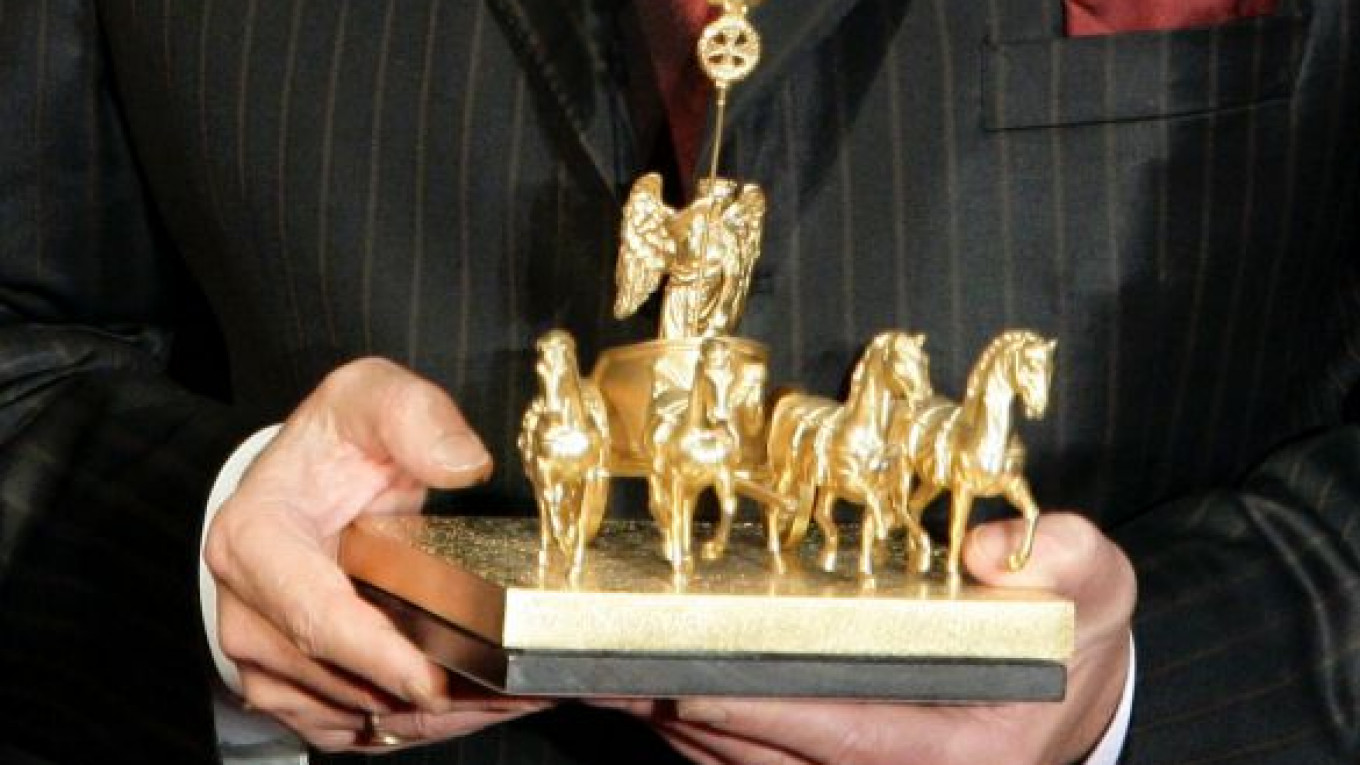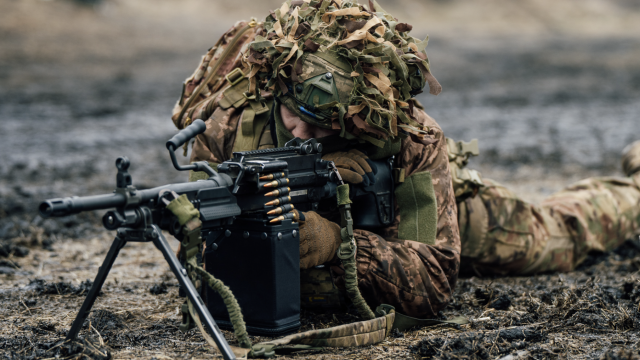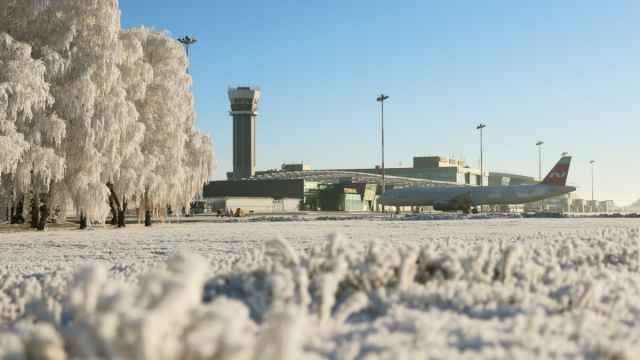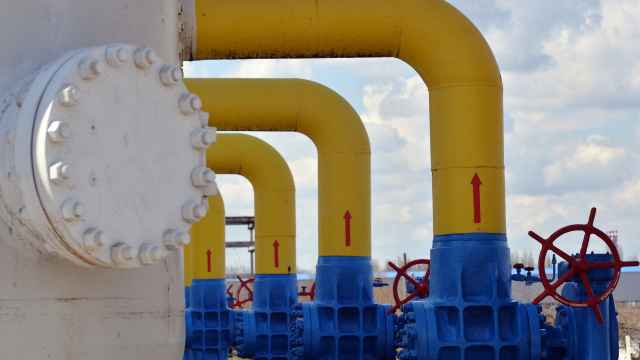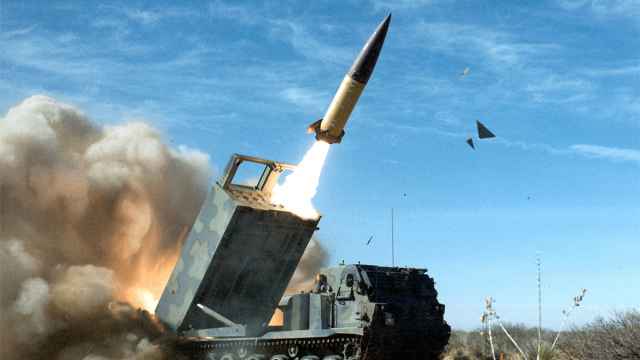President Dmitry Medvedev will meet with German Chancellor Angela Merkel in Hanover this week in what could prove to be awkward talks after a German nonprofit group dropped plans to honor Prime Minister Vladimir Putin.
The Werkstatt Deutschland group announced Saturday that it would cancel its annual prize because of "increasingly unbearable pressure" over its decision to recognize Putin for his role in strengthening German-Russian relations.
Critics complained that the award recognized achievements in freedom and democracy and Putin has rolled back both as he led Russia during his 12 years in power.
Putin's spokesman Dmitry Peskov was quick to say that the flap over the award would not influence relations between the two countries.
"As for Vladimir Putin, he's a recipient of multiple international awards that require no further confirmation," Peskov said, Interfax .
He added that the decision to withdraw the prize reflected the "mess plaguing the prize's board."
Indeed, past Quadriga recipient Jimmy Wales, founder of Wikipedia, and Cem Özdemir, deputy head of the German Green party, resigned from their seats on the prize's board to protest the decision to honor Putin.
In addition, two former recipients, former Czech President Vaclav Havel and Icelandic artist Olafur Eliasson, announced that they would give up their prizes if Putin also got one. German human rights commissioner Markus Loening also criticized the board's choice of Putin.
The situation resulted in the prize board deciding to cancel this year's award altogether due to "massive criticism in media and parts [of the world] of politics," it said in a statement carried by Reuters. The group has handed out the award since 2003 for input in politics, culture and economics.
Other past recipients of the Quadriga include Turkish Prime Minister Tayyip Erdogan, his Greek counterpart George Papandreou, Soviet leader Mikhail Gorbachev and former Ukrainian President Viktor Yushchenko.
Interestingly, the prize's vague description never explicitly says it is awarded for advancement of democracy, speaking instead of "pioneering spirit through political, economic and culture innovations."
Putin was one of four people selected to receive the small statue of a quadriga, a four-horse chariot modeled after the one on the top of Berlin's Brandenburg Gate, as well as a cash prize of 100,000 euros ($140,000), at a ceremony on Oct. 3, a national holiday in Germany commemorating the country's reunification.
Putin, a former KGB agent who served in Dresden in the 1980s, has indeed boosted ties with Germany — to the extent of making former Chancellor Gerhard Schröder, a close friend, the chairman of Gazprom's pipeline venture Nord Stream AG.
The prize's board never released details on who voted for Putin during the nomination. The 20-member board includes, among others, representatives of Bosch, Total and Philip Morris.
Yushchenko, a bitter foe of Putin since Putin supported his rival in the 2004 election that led to the Orange Revolution, has not commented on the prize imbroglio. Neither has Gorbachev, who came out in March to explicitly criticize Putin for cracking down on democracy after years of tacit endorsement.
Merkel, who will host Medvedev for dinner on Monday night and then talks Tuesday, made no public comments about the Quadriga prize over the weekend. She is believed to prefer working with Medvedev over Putin, with whom she has had a strained relationship that observers have linked to Putin's KGB past and Merkel's dislike for the political system he leads.
The Hanover meeting will take place on the sidelines of an annual summit aimed at improving German-Russian ties. Among those scheduled to attend the summit is Volkswagen CEO Martin Winterkorn, whose company is fast expanding in Russia.
While economic relations can be expected to continue to flourish, the withdrawal of the Quadriga deals a "serious blow" to Putin given his strong ties to Germany, said veteran rights activist Lev Ponomaryov.
"He surely didn't predict such a strong negative reaction," Ponomaryov said by telephone Sunday.
But Alexei Mukhin, an analyst at the Center for Political Technologies, played down the prize's significance and the possible fallout of its withdrawal to Putin. If the German establishment wants to give a prize to Putin, they will find a way to do it, Mukhin said.
"I don't think that this situation will influence his authority at home," he added.
Putin enjoys the highest approval ratings of any politician in the country, but support has slowly slipped since the start of this year. Thirty percent of respondents in a June poll by the independent Levada Center said they were not satisfied with his performance, up 10 percent from last year.
In a possibly indirect response to the Quadriga uproar, Putin chose on Friday to justify again one of his most controversial decisions: the 2004 abolishment of direct gubernatorial elections that seriously decreased the population's say in state affairs.
"It might look democratic and very good, but then I saw the criminal elements, rising behind their backs," Putin said of the elections.
"They began to manipulate public opinion and elected governors," he said during a meeting with factory workers in the Urals city of Magnitogorsk, according to a on the government's web site.
Putin's explanation is a noted departure from what he said at the time. In 2004, Putin said nothing about fighting criminals in power, explaining instead that the change was needed to strengthen the country as it combated separatists in the North Caucasus.
The awards that Putin has received from outside Russia include a nomination for the Nobel Peace Prize in 2007, a year before the war with Georgia; the top spot in Vanity Fair's "most influential" list in September 2008, a month before the global recession; and Time magazine's Man of the Year award for 2007, an honor he shares with a diverse group of people from Josef Stalin to Pope John Paul II.
A Message from The Moscow Times:
Dear readers,
We are facing unprecedented challenges. Russia's Prosecutor General's Office has designated The Moscow Times as an "undesirable" organization, criminalizing our work and putting our staff at risk of prosecution. This follows our earlier unjust labeling as a "foreign agent."
These actions are direct attempts to silence independent journalism in Russia. The authorities claim our work "discredits the decisions of the Russian leadership." We see things differently: we strive to provide accurate, unbiased reporting on Russia.
We, the journalists of The Moscow Times, refuse to be silenced. But to continue our work, we need your help.
Your support, no matter how small, makes a world of difference. If you can, please support us monthly starting from just $2. It's quick to set up, and every contribution makes a significant impact.
By supporting The Moscow Times, you're defending open, independent journalism in the face of repression. Thank you for standing with us.
Remind me later.


